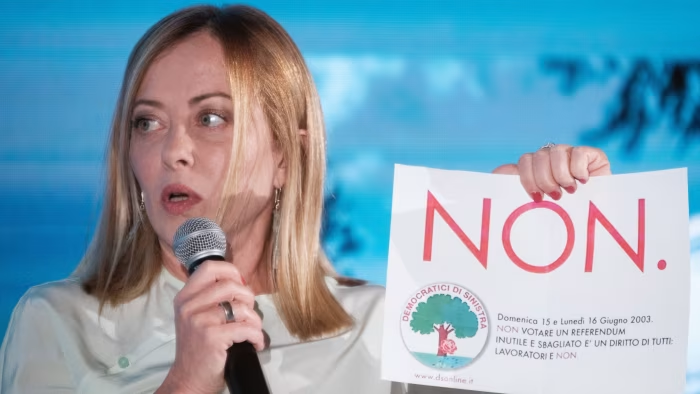Italian voters saw their effort to cut the citizenship waiting time in half collapse on Sunday when turnout fell to roughly 30 percent, well below the 50 percent plus one threshold needed to validate the result. The proposal would have reduced the minimum residency requirement for citizenship from ten years to five, a change that backers said would help immigrants and their children feel more at home in Italy. In reality, that outcome never had a chance once Prime Minister Giorgia Meloni and her right‑wing allies urged citizens to stay away from the polls rather than vote against the reform directly.
Meloni’s party, Brothers of Italy, rolled out internal memos advising local branches to push a boycott strategy instead of a traditional “no” campaign. Senate speaker Ignazio La Russa told supporters he would “march until people stay home,” and Meloni herself made a show of visiting a polling station without casting her own ballot. In doing so, she allowed abstention to replace a negative vote, knowing full well that a low participation rate would render the referendum void. After counting the ballots, officials confirmed that just under a third of eligible voters had shown up, leaving the reform in limbo.
Opposition leaders decried the tactic as a breach of civic duty and a misuse of Italy’s rules on referenda. Democratic Party head Elly Schlein condemned the move as a “betrayal of the constitutional principle that regards voting as a duty.” She argued that Meloni had put short‑term political advantage ahead of Italy’s democratic traditions. On the other hand, Giovanbattista Fazzolari, Meloni’s close adviser, declared that the government had emerged “stronger than ever” and that the left had suffered a significant setback, framing the result as a strategic triumph.
Italy’s requirement for at least half of the electorate to cast a ballot before any referendum can take effect has drawn growing scrutiny in recent years. Critics say the rule turns abstention into a weapon and undermines genuine debate on vital issues. Riccardo Magi of the center‑left +Europa party demanded that lawmakers scrap the turnout threshold after seeing his party’s flagship referendum fail by default. Political analyst Lorenzo Pregliasco went even further, suggesting that the entire referendum system needs an overhaul to match modern voter habits, arguing that repeated low turnouts prove the rule has outlived its usefulness.
Amid the political uproar, many second‑generation immigrants watched the drama with despair, since they had pinned their hopes on a shorter wait for full citizenship. Under current law, children born in Italy to foreign parents cannot apply until age eighteen, and they must prove uninterrupted residence from birth, with no more than ten months abroad in the prior five years. Meanwhile, those with distant Italian roots qualify sooner under the jure sanguinis rule, a discrepancy that critics say treats people born and raised in Italy as second‑class residents despite their cultural ties to the country.
Furthermore, new changes to the naturalization process have centralized applications, forcing all candidates—even those living abroad—to travel to Italy for in‑person interviews, a move that immigrant advocates say adds costs and complexity. In an era when many European nations review their immigration rules, Italy’s decision to tighten procedures drew sharp reactions from human‑rights groups, which warn that it may push families to delay or abandon their citizenship claims altogether.
As Italy’s political landscape shifts, the fallout from this voided referendum will likely echo through future debates on migration and integration. For now, Meloni’s government celebrates a tactical win, while opponents vow to press on, hoping to find new ways to reform a system that many believe needs urgent change.

